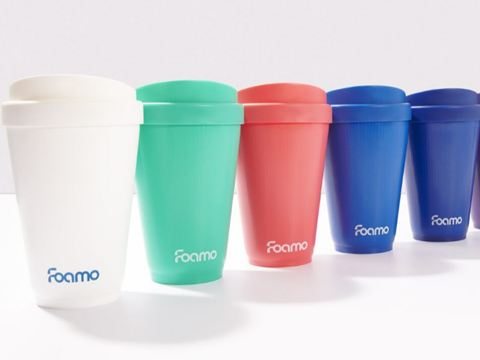
Drinkware manufacturer First Editions has revealed its reuseable coffee cup concept, FOAMO, made from renewable plant-based polypropylene and created using all-electric injection moulding machinery from Sumitomo (SHI) Demag.
First Editions says the cups are designed, engineered and manufactured in Birmingham, UK on two Sumitomo (SHI) Demag IntElect2 machines located at the Birmingham Tyseley Energy Park, with the moulding cells powered solely by electricity generated from an on-site biomass plant.
Reportedly, the cups are made using 85% less virgin polymer material than comparable reusable hot drink cups and the foamed wall reduces plastic use by 50%. The wall is also said to hold heat from hot drinks better, so they stay warm without requiring an extra card sleeve.
The company states the FOAMO cups are made from a renewable feedstock food-grade polypropylene created from 70% waste, such as cooking oil. It adds that they are also fully kerbside recyclable, including the in-mould labelling (IML).
The air bubbles in the foam core are integral to the weight of the cup, apparently 50% lighter compared to traditional plastic coffee cups, resulting in the carbon footprint across the entire production journey being ‘20 times’ smaller. Lids are moulded using a four-cavity tool on the IntElect2 180-ton machine. Each lid features a textured logo and high-quality threads to prevent hot liquids leaking onto consumers.
According to First Editions, independent tests conducted by WMG at Warwick University show that the internal temperature still measures 69°C after 10 minutes and that because the cup uses 50% less material than other reusable cups on the market, the Co2e per kilogram is 0.0372.
FOAMO drinkware is currently available in seven colour variants. They can be customised and co-branded for business channels using the company’s in-house screen and digital print services or purchased directly by consumers through the FOAMO website.
In February, The Coca-Cola Company, Starbucks, PepsiCo and others served reusable takeaway cups as the default in a Closed Loop Partners trial and apparently achieved a 51% return rate, suggesting environmental benefits for mandatory reuse. Reportedly, over 220,000 cups were returned across the twelve-week programme, with ‘minimal’ contamination found in the return bins.
Last month Berry Global revealed that its range of reusable plastic cups was selected for the Borrow Cup collaborative returnable cup initiative which was launched in Glasgow, UK, at the end of January. Borrow Cup allows consumers to borrow a returnable cup from any participating location, involving over 40 businesses including local cafés and major brands such as Costa Coffee, Caffè Nero and Burger King UK.
If you liked this story, you might also enjoy:
The ultimate guide to the Packaging and Packaging Waste Regulation in 2024
How are the top brands progressing on packaging sustainability?
Sustainable Innovation Report 2024: Current trends and future priorities
Everything you need to know about global plastic sustainability regulation














No comments yet